10 Best Hotel CRM Software for Hospitality Industry in 2025
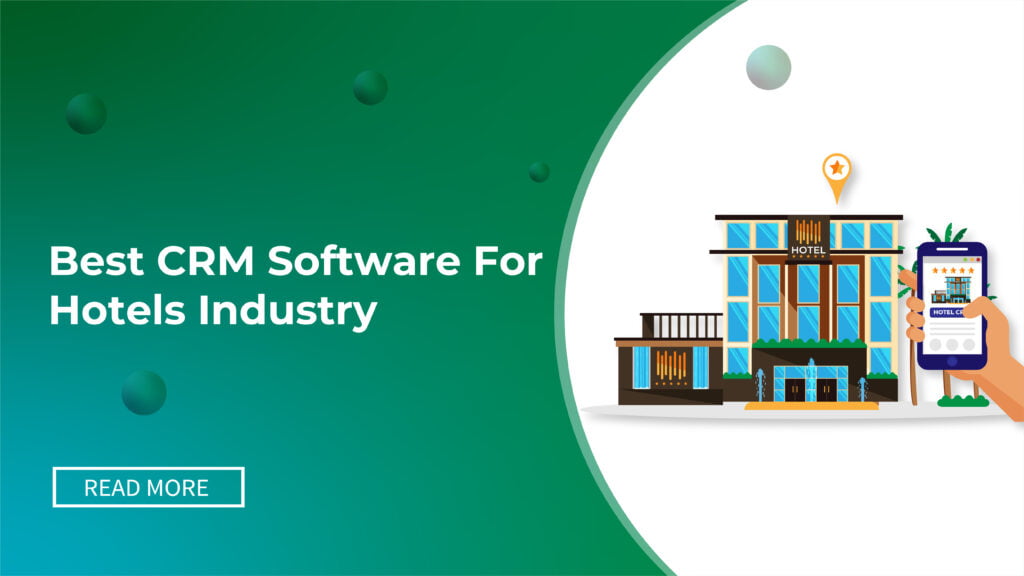
In the hospitality industry, managing guest experiences and daily hotel operations can be challenging. Hotels need to keep track of reservations, guest preferences, housekeeping, and customer service, all while delivering excellent service. To help manage these tasks efficiently, many hotels are turning to Customer Relationship Management (CRM) software.
Hotel CRM systems are designed to streamline operations, improve communication, and personalize guest experiences. With so many CRM options available, it can be tough to choose the right one for your hotel.
In this blog, we’ll look at the 10 best Hotel CRM software for 2025. We’ll explain their key features, how they help solve common hotel problems, and how they can make your hotel run more smoothly. Whether you manage a small bed-and-breakfast or a large hotel, these CRM solutions can help improve guest satisfaction and boost your hotel’s efficiency.
Hotel CRM Software: What is it?
A Hotel CRM, also known as a Customer Relationship Management system, is a customized software solution designed to help hotels and hospitality businesses manage and nurture their connections with guests and customers. It is a primary hub for gathering, organizing, and analyzing guest information, preferences, and interactions. Hotel CRMs allow businesses to provide customized offerings, encourage communication, and enhance the overall guest experience. They can save guest profiles, track booking history, send targeted marketing campaigns, and help with booking and feedback management. Hotels can use a Hotel CRM to better understand their guests, establish loyalty, and eventually boost guest satisfaction and retention, all of which contribute to the success of their business.
👉 Read Also: Best CRM for Service Industry
Hotels need a CRM (Customer Relationship Management) system to streamline guest interactions, enhance personalization, and improve overall service. Here are the key reasons:
- Personalized Guest Experience: A CRM helps hotels store and access guest preferences, booking history, and special requests, allowing them to offer personalized services and experiences.
- Improved Communication: Hotels can use CRM to send targeted messages to guests, such as booking confirmations, special offers, or follow-up surveys, ensuring consistent communication across channels.
- Increased Guest Loyalty: By tracking guest preferences and engagement, a CRM enables hotels to create loyalty programs, offer discounts, and send tailored promotions, encouraging repeat visits.
- Streamlined Operations: CRMs centralize guest information, allowing staff to quickly access details and handle requests efficiently, which leads to faster service and improved operational workflow.
- Better Marketing: With CRM data, hotels can segment their guest list and create targeted marketing campaigns based on demographics, behavior, and past stays, improving the relevance of offers.
- Data-Driven Insights: CRMs provide analytics on booking patterns, guest preferences, and satisfaction levels, helping hotels make informed decisions and adjust their services or marketing strategies.
- Seamless Integration: CRMs integrate with booking engines, payment systems, and other hotel management software, offering a unified system to handle reservations, check-ins, and guest requests.
Key Features of Hotel CRM Software
- Guest Data Collection: A hospitality CRM gathers guest information from various sources like the hotel website, social media, ad campaigns, online listings, JustDial, and IndiaMART. This helps build a comprehensive database of potential and existing guests.
- Guest Profiling: Hotel CRM software stores detailed guest information, creating individual profiles that include preferences, booking history, and personal details. This allows for personalized service and targeted marketing.
- Booking Management: CRM for hotels handles reservations efficiently, managing check-ins, check-outs, and itinerary details. This ensures smooth operations and enhances guest satisfaction.
- Automated Communication: A hotel CRM system sends automated emails and messages to guests for booking confirmations, special offers, and post-stay follow-ups. This improves guest engagement and saves staff time.
- Enhanced Marketing: Hospitality CRM includes integrated email marketing tools and can provide WhatsApp API for marketing campaigns. This allows hotels to reach guests through multiple channels effectively.
- Integrated IVR Solution: Many hotel CRMs include IVR systems to manage incoming calls efficiently. Guests can get information, make bookings, or leave messages, improving the overall customer service experience.
- Analytics and Reporting: CRM for hotels offers insights on marketing campaign performance, sales activities, booking numbers, and revenue. These reports help management make data-driven decisions to improve hotel performance.
👉 Read Also: Benefits of CRM
Top 10 CRM Softwares for Hotel Industry
Here’s a comprehensive overview of the top 7 CRM software for hotels, focusing on their key features, pros, and cons to help you make an informed decision.
1. Salestown CRM: Best For Hotel CRM & Hospitality CRM
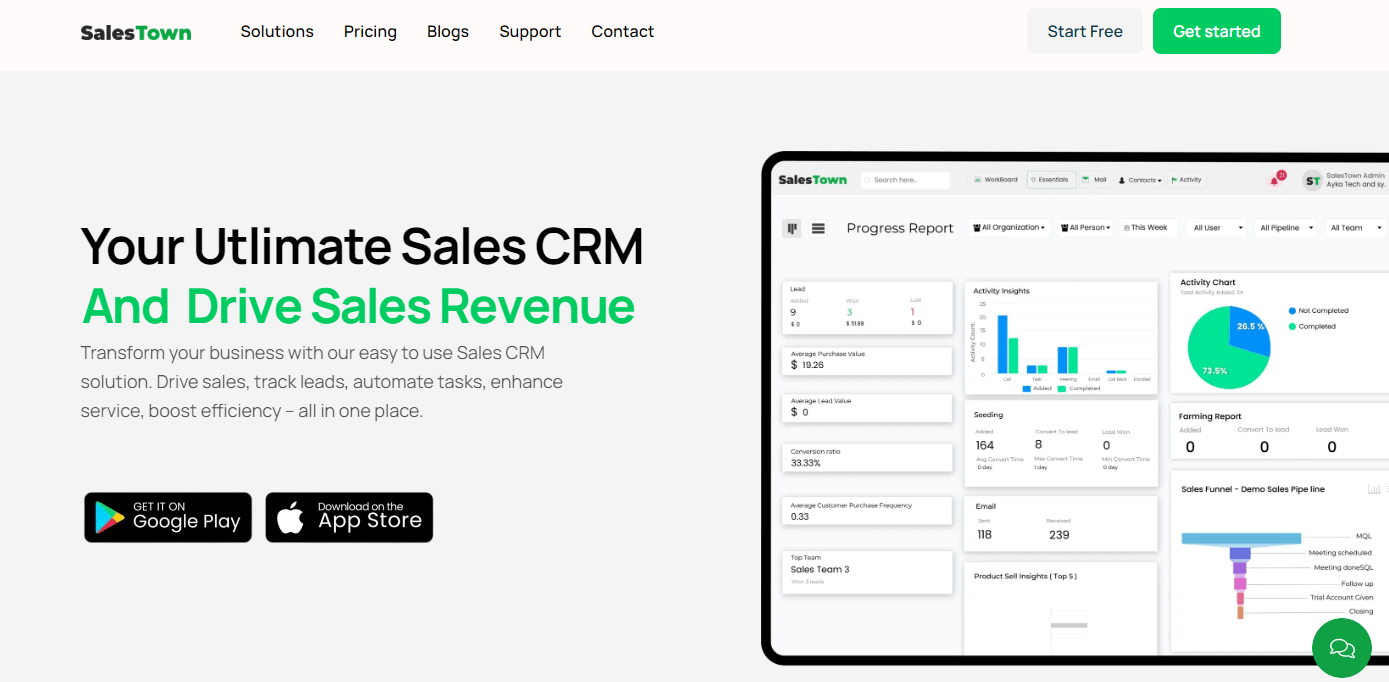
Overview: Salestown CRM is a versatile and powerful CRM solution designed to cater to various industries, including hospitality. It focuses on improving guest experience, streamlining operations, and enhancing revenue management.
Key Features:
- Unified Guest Profiles: Integrate guest data from various sources for a holistic view. This includes contact details, booking history, preferences, and feedback.
- Personalized Service: Deliver personalized experiences based on guest preferences and history. For example, offering favorite amenities or room preferences.
- Automated Workflows: Streamline operations with automated booking confirmations, reminders, and follow-ups. This reduces manual work and ensures timely communication with guests.
- Email Marketing: Execute email marketing campaigns based on guest data. Send special offers, newsletters, and updates to specific guest segments and Monitor the effectiveness of email campaigns, track open rates, and measure guest engagement. all within your CRM.
- Itinerary Management: Create and manage guest itineraries, including activities, reservations, and special events also Customize itineraries based on guest preferences and past behaviors.
- Analytics and Reporting: Generate detailed reports to track performance and guest satisfaction. This helps you understand trends and improve services.
- Mobile App: Manage CRM functions on the go with a dedicated mobile app. Staff can access guest profiles, update records, and communicate with guests from anywhere.
Pros:
- Affordable pricing.
- User-friendly interface.
- Strong focus on personalization.
Cons:
- Limited integration options compared to larger CRM providers.
- May require additional customization for large hotel chains.
2. Salesforce Hospitality Cloud: Best For Hospitality CRM
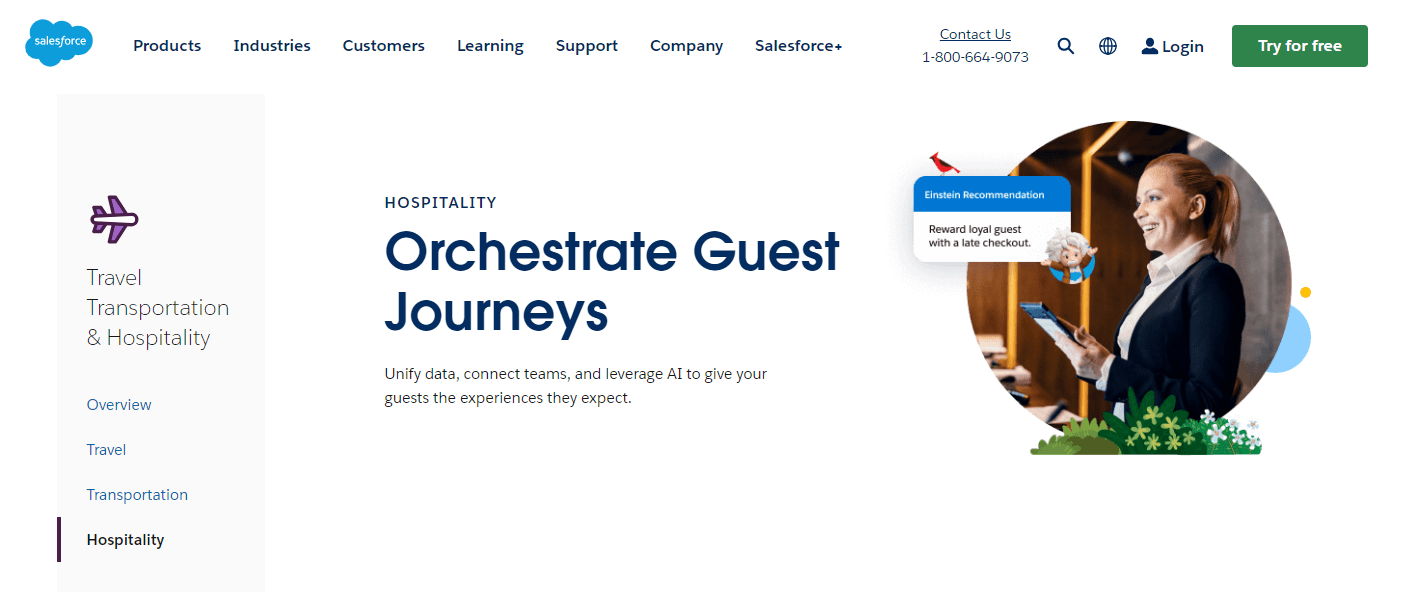
Overview: Salesforce Hospitality Cloud is a robust CRM solution tailored for the hospitality industry. It offers a comprehensive suite of tools designed to enhance guest experiences and streamline operations.
Key Features:
- Guest Profile Management: Consolidate guest data from various sources to create comprehensive profiles. This includes contact details, preferences, past stays, and feedback. These profiles help staff provide personalized service and targeted marketing.
- Personalized Marketing: Tailor marketing campaigns based on guest preferences and behaviors. For example, send special offers to guests who frequently book spa services or dine at the hotel restaurant.
- Mobile Access: Access CRM features on the go with a mobile app. This allows hotel staff to check guest profiles, update records, and respond to inquiries from anywhere.
- Integration: Seamlessly integrates with other Salesforce products and third-party applications. This means you can connect your CRM with your property management system (PMS), booking engine, and other software.
- Analytics and Reporting: Advanced analytics to track performance and customer behavior. This helps you understand trends, measure the effectiveness of marketing campaigns, and improve guest satisfaction.
Pros:
- Highly customizable.
- Extensive integration options.
- Strong analytics and reporting tools.
Cons:
- Can be expensive for smaller hotels.
- Steep learning curve for new users.
3. Oracle Hospitality OPERA Cloud: Best CRM For Hospitality Industry
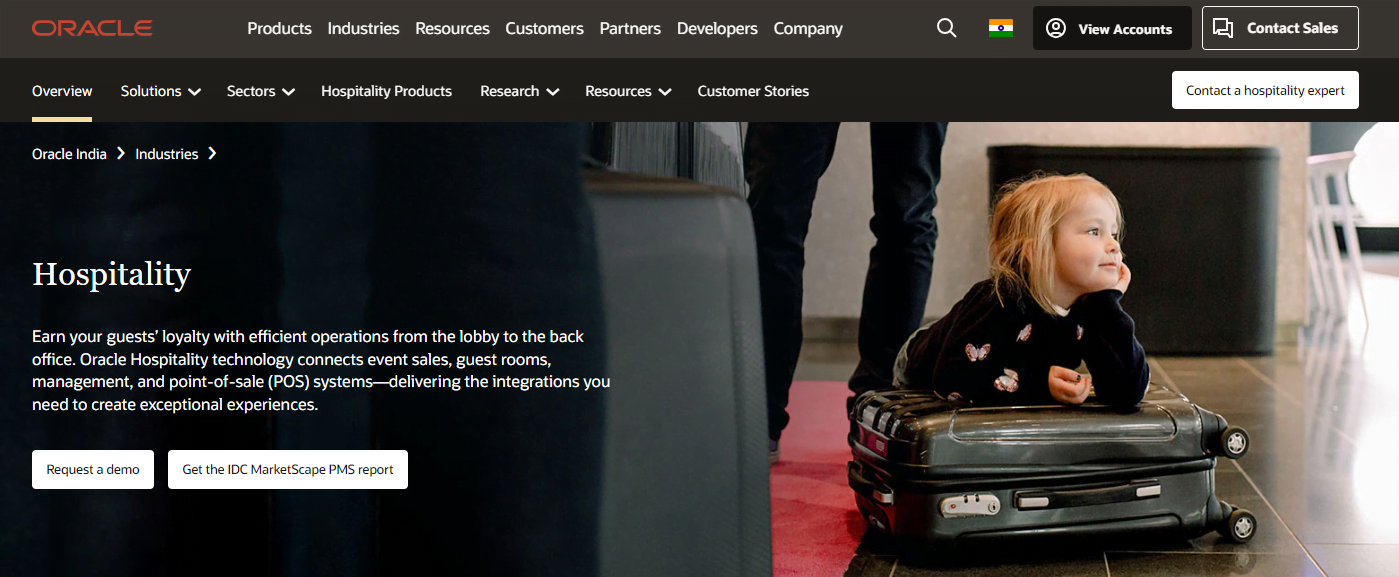
Overview: Oracle Hospitality OPERA Cloud is a comprehensive property management system (PMS) that includes CRM capabilities. It is designed to support hotels of all sizes, from independent properties to large chains.
Key Features:
- Centralized Guest Information: Consolidate guest data for better service and targeted marketing. All guest information, including reservations, preferences, and history, is stored in one place.
- Reservation Management: Efficiently manage room reservations and availability. This ensures smooth booking processes and helps prevent overbooking.
- Sales and Catering Management: Tools to manage events, banquets, and catering services. This is ideal for hotels that host conferences, weddings, and other large events.
- Mobile Access: Access system features via mobile devices. Staff can update reservations, check guest information, and communicate with guests from anywhere.
- Cloud-Based: Operate on a secure, scalable cloud platform. This ensures that your data is safe and that the system can grow with your business.
Pros:
- All-in-one PMS and CRM solution.
- Scalable for different hotel sizes.
- Strong support and training resources.
Cons:
- Implementation can be complex.
- Higher cost compared to some competitors.
4. Amadeus Hospitality CRM: It’s designed to help hotels improve guest engagement and loyalty.
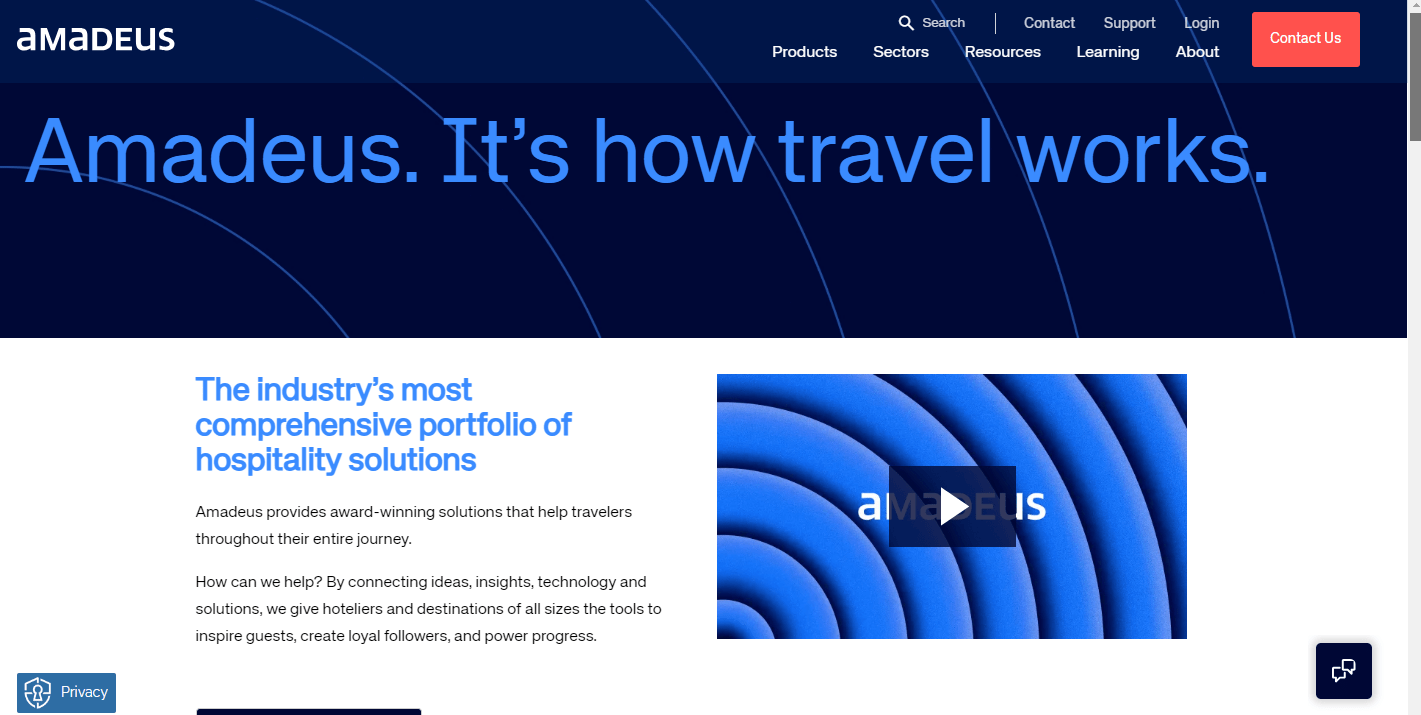
Overview: Amadeus Hospitality CRM is designed to help hotels improve guest engagement and loyalty. It provides tools for managing guest profiles, personalized marketing, and performance analytics.
Key Features:
- Guest Profiles: Create detailed guest profiles to tailor services and communications. This includes contact details, preferences, and past interactions with the hotel.
- Campaign Management: Execute targeted marketing campaigns based on guest data. You can send personalized emails, special offers, and loyalty rewards to specific guest segments.
- Loyalty Programs: Manage and track loyalty programs to reward repeat guests. This helps build guest loyalty and encourages repeat bookings.
- Integration: Integrates with Amadeus’ other hospitality solutions and third-party systems. This ensures smooth data flow between different parts of your operation.
- Analytics: In-depth analytics to measure campaign effectiveness and guest satisfaction. This helps you make informed decisions to improve your services.
Pros:
- Comprehensive guest profiling.
- Effective campaign management tools.
- Strong integration capabilities.
Cons:
- Can be pricey for smaller properties.
- Requires training to fully utilize features.
5. Zoho CRM Plus: Best CRM For Hotel Management
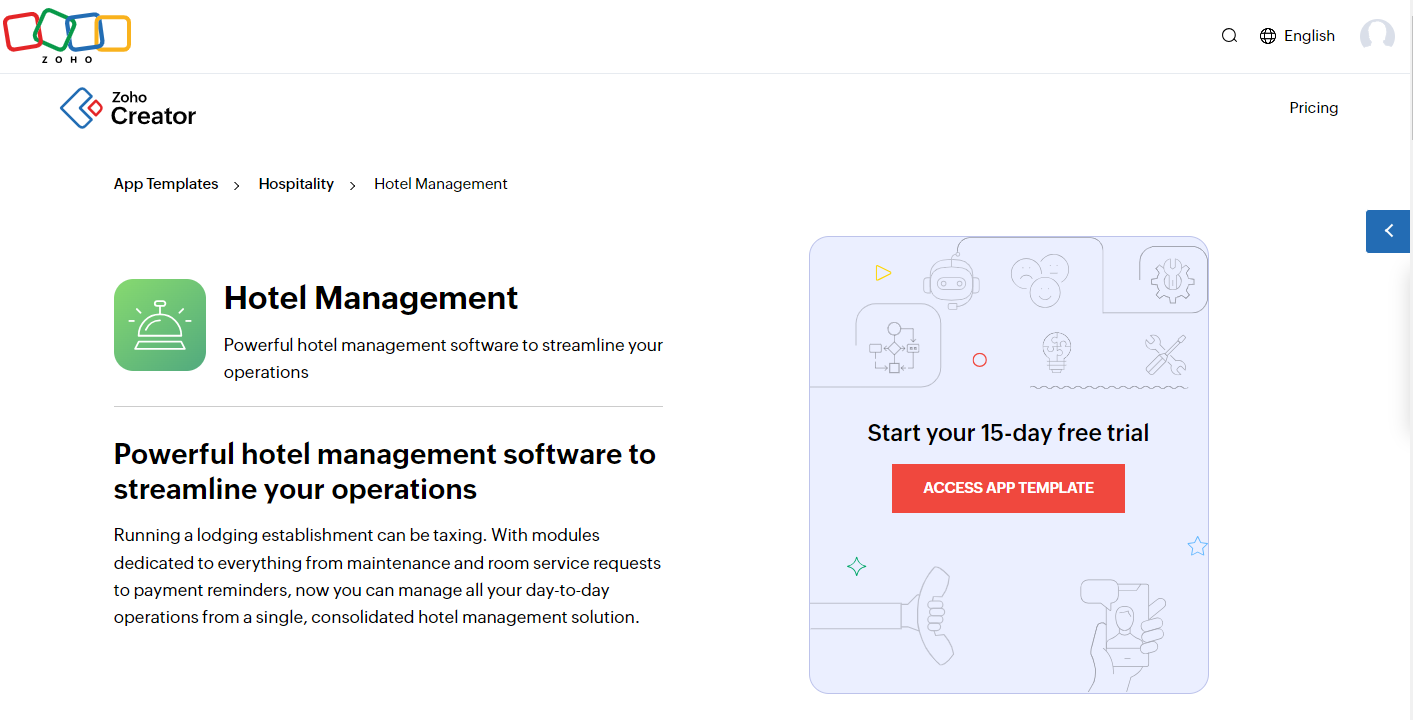
Overview: Zoho CRM Plus is a versatile CRM solution that can be customized for the hospitality industry. It offers a suite of tools for managing customer relationships, marketing, and sales.
Key Features:
- Multi-Channel Communication: Engage with guests through email, social media, and chat. This ensures you can reach guests on their preferred platforms.
- Automation: Automate routine tasks and workflows to save time. For example, you can set up automated email responses, booking confirmations, and follow-up reminders.
- Customizable Dashboards: Create custom dashboards to track key metrics. This allows you to monitor performance and make data-driven decisions.
- Mobile Access: Full mobile app support for on-the-go access. Hotel staff can update guest information, manage reservations, and communicate with guests from anywhere.
- Integration: Integrates with a wide range of third-party applications. This includes property management systems, booking engines, and payment gateways.
Pros:
- Cost-effective.
- Easy to use and set up.
- Extensive customization options.
Cons:
- Some advanced features require technical expertise.
- Limited industry-specific templates compared to competitors.
6. HubSpot CRM: Best For Hotel CRM & Hospitality CRM
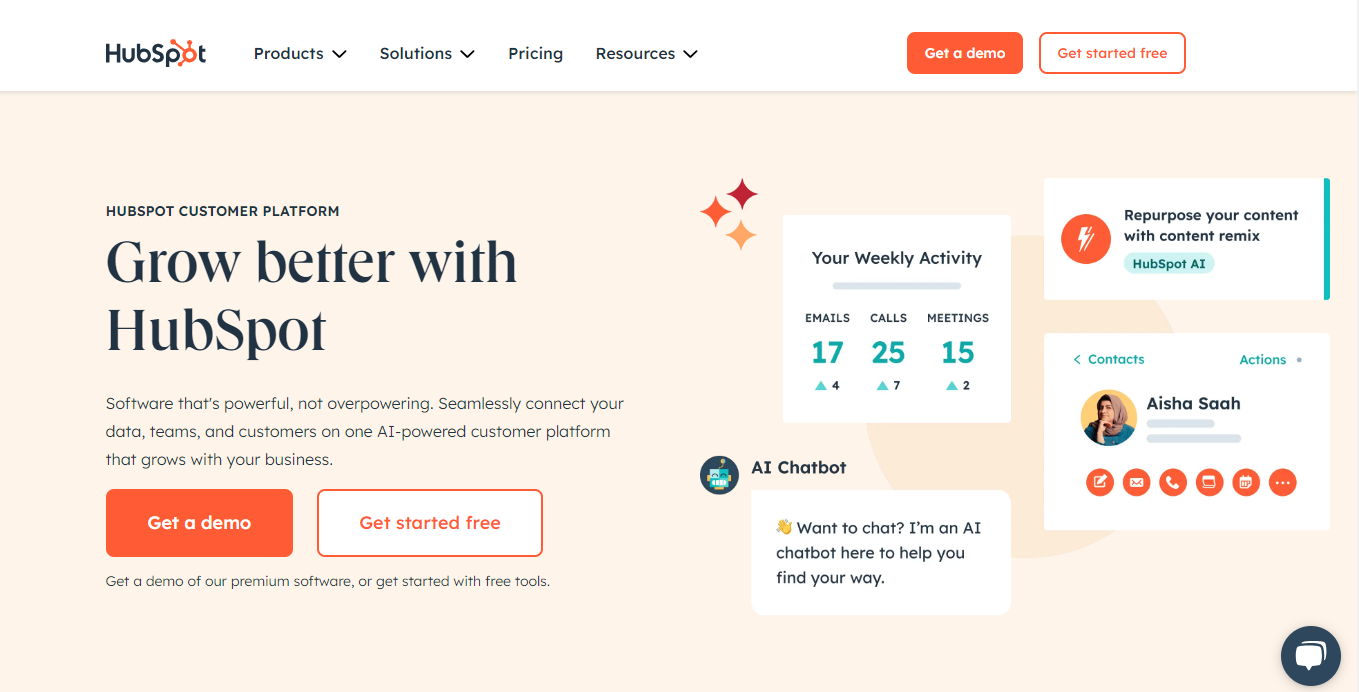
Overview: HubSpot CRM is a popular choice for businesses across various industries, including hospitality. It offers a free basic version with scalable features for growing needs.
Key Features:
- Contact Management: Store and manage detailed guest information. This includes contact details, booking history, and communication logs.
- Email Marketing: Create and send targeted email campaigns. You can use templates or create custom emails to engage guests.
- Sales Pipeline Management: Track and manage sales opportunities and leads. This helps you monitor the progress of bookings and follow up with potential guests.
- Automation: Automate repetitive tasks to improve efficiency. For example, set up automated booking confirmations and follow-up emails.
- Analytics: Access comprehensive analytics to measure performance. This includes tracking email campaign effectiveness and guest satisfaction.
Pros:
- Free basic version available.
- Easy to use with a clean interface.
- Extensive support and resources.
Cons:
- Some advanced features are only available in paid versions.
- Limited industry-specific features compared to specialized CRMs.
7. Revinate: Best CRM For Hotel Industry
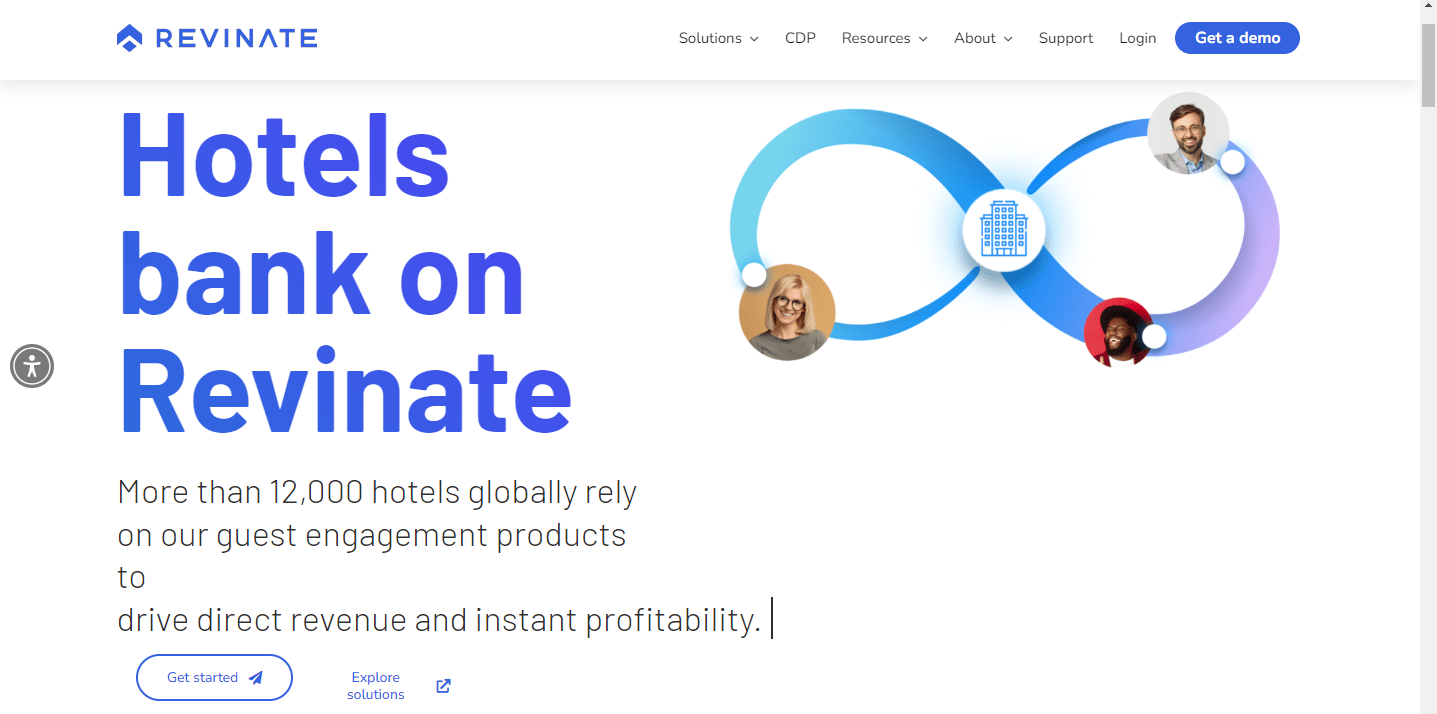
Overview: Revinate is a CRM specifically designed for the hospitality industry. It focuses on helping hotels manage guest feedback, marketing, and reputation.
Key Features:
- Guest Feedback Management: Collect and analyze guest reviews from multiple platforms. This helps you understand guest experiences and areas for improvement.
- Email Marketing: Execute personalized email marketing campaigns. You can send targeted emails based on guest preferences and behaviors.
- Reputation Management: Monitor and respond to online reviews. This helps you maintain a positive online reputation and address any issues promptly.
- Guest Surveys: Create and distribute surveys to gather guest insights. This helps you understand guest preferences and improve services.
- Integration: Integrates with various PMS and booking systems. This ensures smooth data flow and enhances operational efficiency.
Pros:
- Specialized in hospitality.
- Strong focus on guest feedback and reputation.
- Effective email marketing tools.
Cons:
- Pricing can be high for smaller hotels.
- Limited functionality beyond guest feedback and marketing.
8. Cendyn eInsight CRM: Best for Comprehensive Hotel Guest Management
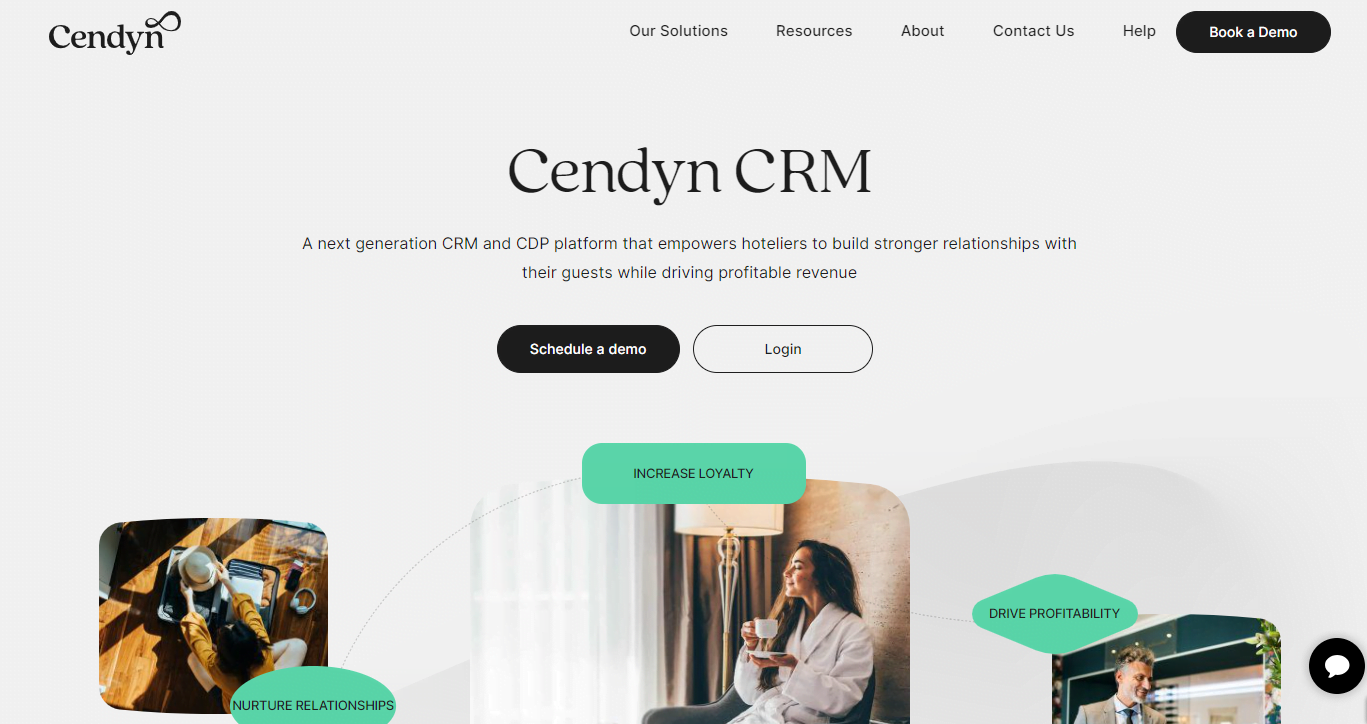
Overview: Cendyn eInsight CRM is a comprehensive solution specifically designed for the hospitality industry, focusing on guest engagement and loyalty.
Key Features:
- Guest Profile Management: Centralize guest data from multiple sources for a 360-degree view.
- Automated Marketing Campaigns: Create and execute targeted marketing based on guest preferences and behaviors.
- Revenue Management Integration: Integrate with revenue management systems for optimized pricing strategies.
- Loyalty Program Management: Manage and track guest loyalty programs efficiently.
- Predictive Analytics: Use AI-driven insights to anticipate guest needs and preferences.
Pros:
- Deep hospitality industry focus
- Strong data integration capabilities
- Advanced analytics and reporting
Cons:
- Can be complex for smaller properties
- Higher price point compared to some competitors
9. Guestfolio CRM: Best for Boutique and Independent Hotels
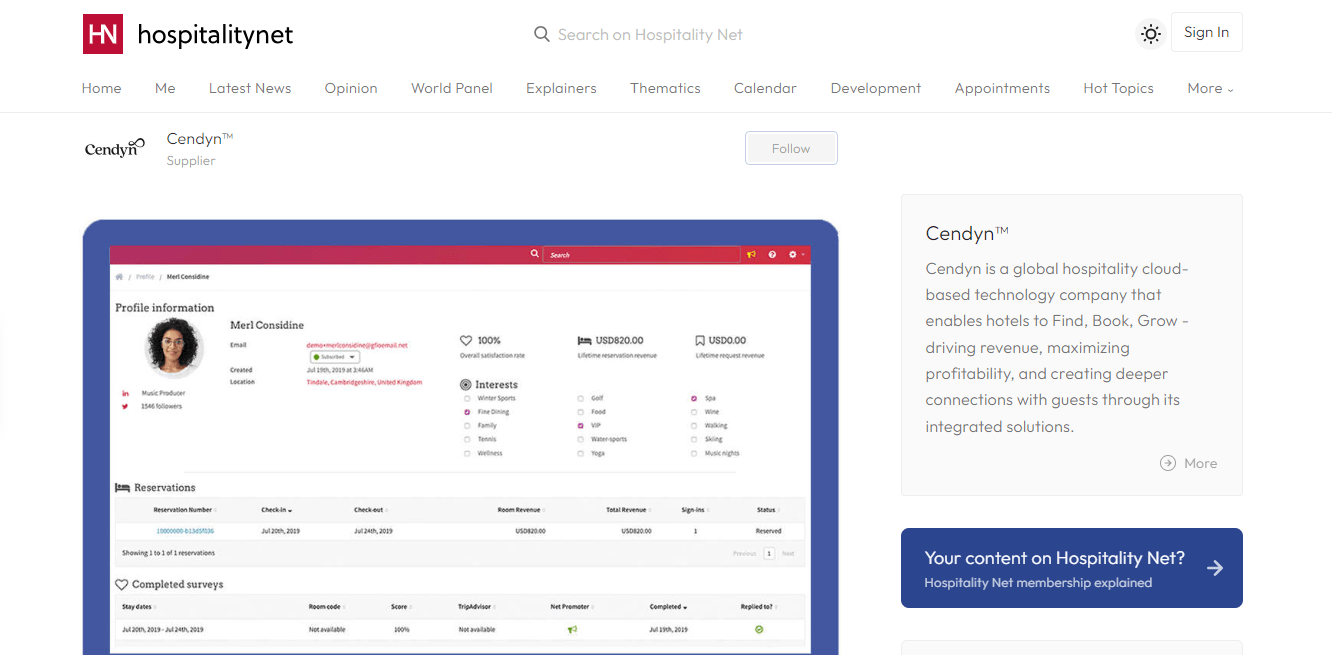
Overview: Guestfolio CRM is tailored for boutique and independent hotels, focusing on guest communication and personalization.
Key Features:
- Pre-arrival Communication: Automate personalized pre-arrival emails to enhance guest experience.
- Upsell Opportunities: Identify and execute targeted upsell opportunities.
- Guest Surveys: Create and distribute post-stay surveys for feedback collection.
- Mobile Concierge: Offer a mobile-friendly platform for guest engagement during their stay.
- Social Media Integration: Monitor and respond to social media mentions and reviews.
Pros:
- User-friendly interface
- Strong focus on guest communication
- Suitable for smaller, independent properties
Cons:
- Limited advanced features compared to enterprise solutions
- May require additional integrations for comprehensive functionality
10. Quore: Best for Hotel Operations and Guest Request Management
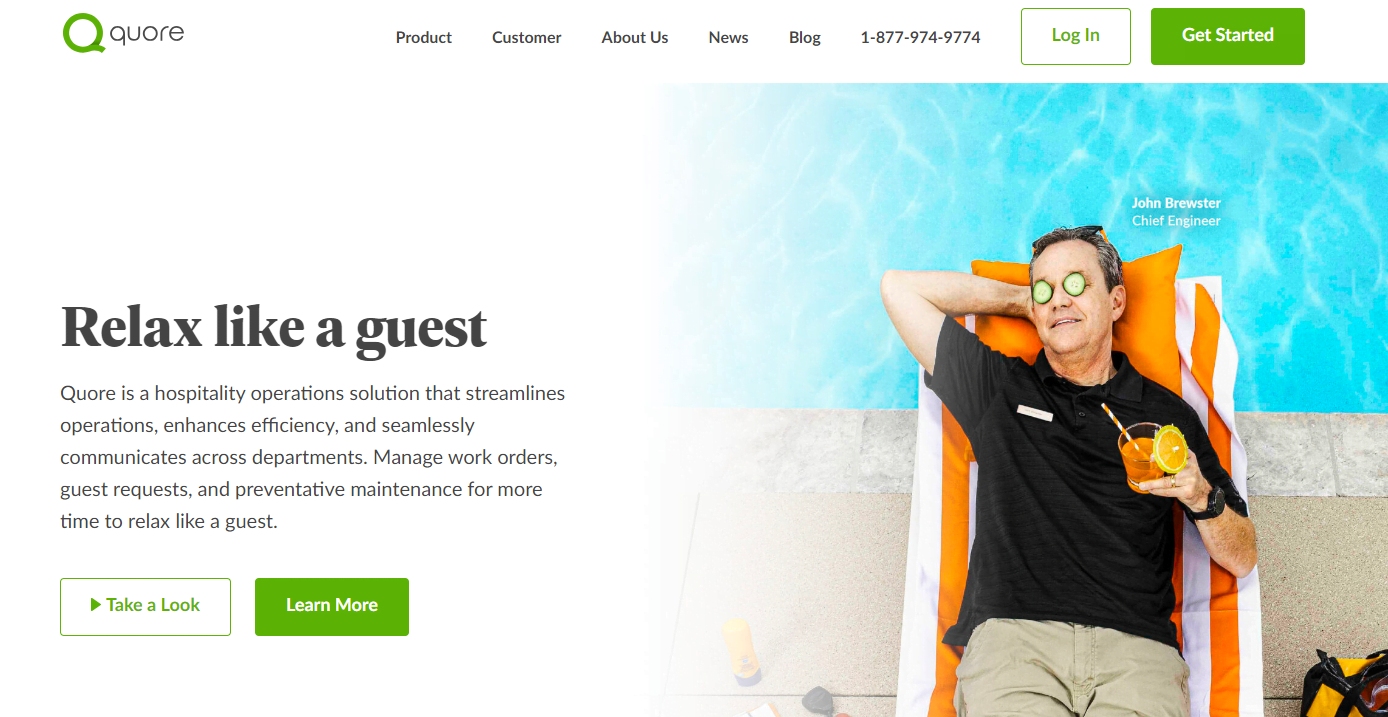
Overview: Quore is a hotel operations platform with CRM capabilities, focusing on streamlining internal communication and guest request management.
Key Features:
- Guest Request Tracking: Manage and track guest requests efficiently.
- Preventive Maintenance: Schedule and manage property maintenance tasks.
- Staff Communication: Facilitate internal communication between departments.
- Housekeeping Management: Optimize housekeeping operations and room turnover.
- Reporting and Analytics: Generate reports on operational efficiency and guest satisfaction.
Pros:
- Strong focus on hotel operations
- Mobile-friendly for on-the-go management
- Improves interdepartmental communication
Cons:
- Less focus on marketing features compared to traditional CRMs
- May require additional software for comprehensive marketing capabilities
How to set up your hotel CRM Software for better guest management
Setting up your hotel CRM (Customer Relationship Management) platform is crucial for managing guest interactions, streamlining operations, and boosting revenue. Here’s how you can approach it:
- Connect Contact Forms: Seamlessly integrate your website’s contact forms with your CRM. This allows you to automatically capture lead information, such as names, email addresses, and inquiry details, into your CRM database for efficient follow-up and nurturing.
- Customize Guest Profiles: Create custom fields within your CRM to accurately capture guest preferences, dietary restrictions, and other relevant details. This personalized information empowers your staff to deliver tailored experiences, enhancing guest satisfaction and loyalty.
- Automate Marketing Campaigns: Leverage the power of your CRM’s Email marketing automation capabilities. Set up Email campaigns, personalized email sequences, and targeted promotions based on guest behavior, preferences, and booking history. This approach ensures timely and relevant communication, increasing conversions and repeat bookings.
- Streamline Sales Processes: Utilize your CRM’s sales management features to efficiently schedule and track venue tours for potential event clients. Equip your sales team with real-time access to guest data, enabling them to provide personalized experiences and effectively address specific needs and requirements.
- Integrate with Other Systems: Ensure seamless data flow by integrating your CRM with other essential systems, such as your social media, Ads, and online booking platforms. This interconnectivity minimizes manual data entry, reduces errors, and provides a comprehensive view of guest interactions.
How to Choose the Best CRM Software for Hotels
Identify Needs and Goals: Determine key needs such as boosting guest interactions, increasing marketing efforts, and easing reservation management. Outline the main goals you want to achieve with CRM adoption, such as increased repeat guests, higher online reservations, improved operations, and so on. This expands the required capabilities.
Evaluate Integration Capabilities: Examine how well potential CRMs integrate with your main hotel management systems, such as your Property Management System, reservation platforms, and POS software. For effective workflows, seamless connection between platforms is essential.
Prioritize Usability and Adoption: The CRM should have a simple to use user-friendly design and functionalities that are specific to hotel staff throughout departments. If employees find it too complicated or difficult to use, adoption rates drop, compromising ROI.
Analyze Reporting and Analytics: Reporting, analytics, and business intelligence should deliver data-driven knowledge into guest tastes, sourcing analysis, and booking trends. This is essential to making decisions based on facts in order to improve guest personalization.
Conclusion:
Providing great customer service is key in the hotel business. You want guests to enjoy their stay, return often, and recommend you. But juggling reservations, requests, marketing, and more without the right tools is tough. A hotel CRM brings everything together in one place. It helps you with personalizing service ,Automate marketing , Manage reservations smoothly, rack issues and solve them fast.
A CRM like Salestown makes running your hotel easier. It coordinates your staff and systems. This keeps guests happier. And happy guests keep coming back and spread the word.
Contact us to learn more. See how an affordable, easy-to-use CRM Software can help your hotel be its best. We’ll show you how it can help you provide great service to every guest.
Frequently Asked Questions ( FAQ)
Q. what is Hotels CRM system and how dose it help with guest satisfaction?
A Hotels CRM system is a tool that helps hotels manage and analyze their interactions with guests. It stores guest information, preferences, and feedback, allowing hotels to personalize services and anticipate guest needs. By centralizing data, it streamlines communication across hotel departments, improving efficiency. The system enhances guest satisfaction by enabling personalized experiences, efficient communication, and prompt issue resolution, ultimately fostering a positive and memorable stay.
Q. How can I implement a Hotels CRM system in my hotel?
Implementing a Hotel CRM system involves selecting the right software (SalesTown) or service provider, training staff, and integrating the CRM with other hotel management systems. It’s important to have a well-defined strategy and clear goals for CRM implementation.
Q. What training and support are typically offered with Hotels CRMs?
Hotel CRM providers often offer training and support to help your staff get up to speed with the system. Look for a provider that offers training resources, documentation, and responsive customer support.
Q. How can a Hotel CRM benefit my hotels?
A Hotel system can significantly benefit your hotels by enhancing guest experiences and improving overall efficiency. It allows you to track guest preferences, streamline communication, and personalize services, leading to higher guest satisfaction and loyalty. With a centralized system, you can manage reservations, automate tasks, and gain valuable insights to make informed business decisions. Ultimately, a Hotel CRM contributes to increased guest retention, operational efficiency, and a positive reputation for your hotels.
